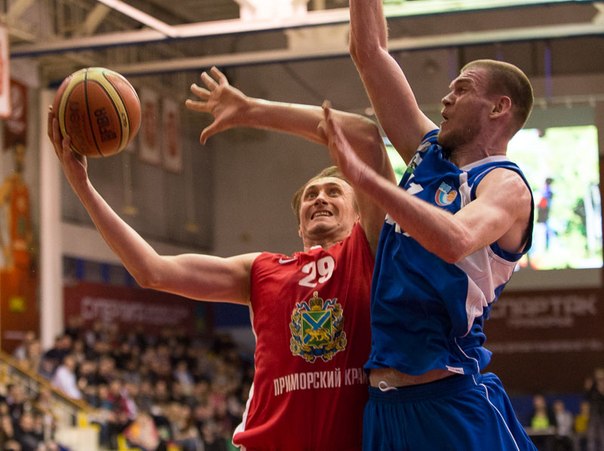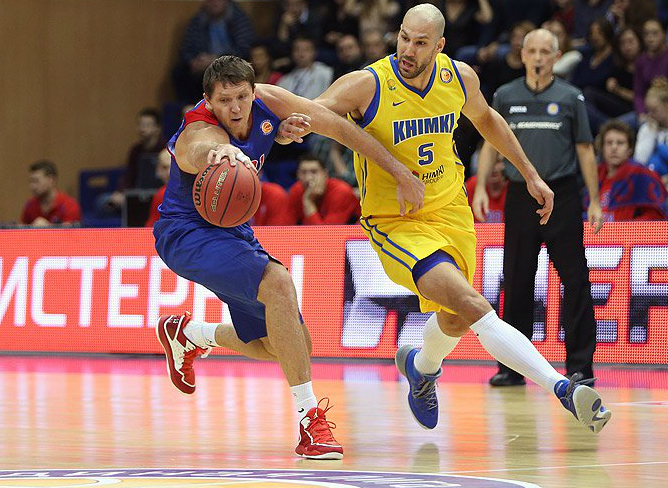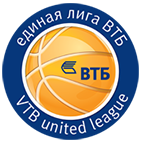16december
Nikita Morgunov On Veteran Players (Part I)

VTB-League.com presents a brand-new Expert Opinion, our blog featuring the sport's top minds and their thoughts on the latest developments in the VTB United League.
2007 EuroBasket champion Nikita Morgunov is the author of today's blog post. The Russian big man retired earlier this year, wrapping up an incredible 22-year career that began at CSKA in 1993. Morgunov shares about life as a veteran player and discusses other prominent basketball vets, such as Kobe Bryant and Viktor Khryapa.
***
A veteran is a relative term. How does one qualify as a veteran: do you base it on age or experience? As far as age is concerned, all you need to know is the player's date of birth. At the same time, I think that you also need to have a long, productive career to be granted veteran status. Sitting on the bench, no matter how long, doesn't make you a veteran.
The Role
Not only does a veteran provide leadership for younger players and bring the team together, he also prepares other players to assume his role in the future. It's easy to listen to a more experienced teammate and do what you're told. It's much more difficult when those players retire and leave a vacuum. You might have players on a team that are old enough to be veterans, but are completely unprepared to help the coach guide the team.
An experienced player needs to do more than rest on his past success. Young players only remember the past two-three seasons. They don't know about the distant past. A veteran needs to maintain his status and do just as much work at practice as younger players. Veterans earn respect on a team not just with their titles and trophies, but also by how they conduct themselves.
Veterans should help on the court, give advice and avoid being bossy during difficult stretches. Occasionally, when younger players get full of themselves, they should know how to put them in their place.
The Preparation
I know from personal experience how important it is to prepare for the season and pace yourself. Both the physical and mental aspects are important. If you don't prepare well in your 30's, your body will let you know immediately. You can't be lazy at that age.
You also can't underestimate the mental side of the game. The most important thing is to stay motivated. I was always searching for motivation over the last five years. When I was 33-34, I didn't have trouble with it. But after I suffered a bad injury, I had to motivate myself and nurture my desire to continue playing. In the end, I could tell that I didn't have the adrenaline or burning desire to win that I had once had.
But my desire to help my team qualify for the VTB United League and play against excellent competition gave me the boost I needed to continue my career. If a person is motivated, he'll continue to take the court.
Kobe Bryant
When Kobe Bryant's health failed, his ability to play also decreased. No matter how badly we wants it, he can't be the Black Mamba anymore. Desire and work ethic aren't enough. We don't know all the details, but I don't think Bryant should have forced his rehab. He should have changed his mental approach by letting go of the pressure and not interacting so much with the media. Kobe's announcement that this would be his last season came across as a surrender to the basketball world. He gave up when he realized he could no longer be the Kobe Bryant he'd always been.

I heard the same thing five years ago: "Better to leave now and people will remember you as a winner." At a certain point, I realized that I could help young players develop, move forward and become leaders. In Kobe Bryant's case, you can see the ego of this incredible player. Perhaps he could have returned if he had shared the role of leader on the team.
About Myself
People always asked me what motivated me. Why did I continue to play and move to Vladivostok after accomplishing so much in my career? I had one simple answer: "I don't want to be inferior in any way to each new generation." How many generations were there in my career? It's hard to count... My professional career lasted 25 years. There were instances when my coaches were my peers or even younger than me. That was also motivation. It turns you there's still more to learn about basketball at age 40.

Everything was pretty easy up until age 28-29. My motivation for each game or competition helped me play at a high level. When I turned 29, I realized that I couldn't rest on my laurels anymore or afford to cut corners. It wasn't as easy to keep up with other big men or outmuscle a younger player under the basket. Basketball players can panic in those moments, realizing that they'll never get back what they used to have.
Igor Alexandrovich Zavyalov was my offseason coach for many years. I will always be grateful to him. He helped me rethink and redo my offseason routine, as well as my sleeping and eating habits. My mental approach completely changed. It turned out I could be better than I had been two or three years before. That's what helped me return to the Russian national team and win gold at the 2007 EuroBasket.
Before, I thought putting in work at practice and playing hard in a game was all that you had to do. How might my career have been different if I had changed my approach to the game at an earlier age?
Current Veterans
Viktor Khryapa, Sergey Monia, Egor Vyaltsev, Sergey Bykov: these are true veterans, playing at the highest level in the VTB United League. Andrey Vorontsevich is starting to reach that level (certainly in terms of playing experience). There are lots of other guys who are close to reaching veteran status, though I don't think they'd want me to call them that. They still have enough energy to match younger players.
These players are motivated by a desire to win. It's not about money or greed, as some think. When we were younger, we didn't take certain competitions very seriously. We wasted our talent and missed out on wins and accomplishments. When you're older, you realize that you could have done more, if you had taken your job more seriously. Experienced guys realize that they still have enough in the tank for new victories. Most importantly, they have the experience to take full advantage of their abilities. At that stage, no one wants to retire.
Viktor Khryapa
Viktor Khryapa is our most important veteran. He's a coach, team motivator and a captain all in one. His importance to the team has been felt since 2007. Vitya is one of Russia's biggest talents, but he also knows when to be tough and when to lighten the mood. He can go to bat for any of his teammates in the front office. In earlier years, he provided a link between younger and older players. Khryapa united everyone and got us on the same page.

I wish Vitya good health, motivation (which I believe he has plenty of) and as long of a career as possible. Young players need teammates like him that embody professionalism.
To be continued...
Nikita Morgunov,
2007 EuroBasket champion, 1998 World Championships runner-up












































